Students and Sensors: Data, Education, Privacy, and Research Essay
VerifiedAdded on 2023/06/04
|5
|1694
|393
Essay
AI Summary
This essay analyzes the ethical implications of collecting and sharing student data by universities, focusing on the scenario of data collected through sensors. The essay applies four classical ethical theories: Utilitarianism, Deontology, Virtue theory, and Contract theory, to evaluate the ethical dilemmas. It examines whether the collection and sharing of student data, often without explicit consent, aligns with the principles of each theory. The analysis considers issues such as the lack of student opt-out options, potential privacy breaches, and the balance between benefiting the university and respecting student rights. The essay concludes with recommendations for ethical data handling, emphasizing the need for student consent, anonymization of data, and the right to opt-out, to ensure data collection practices are ethical and do not compromise student privacy.
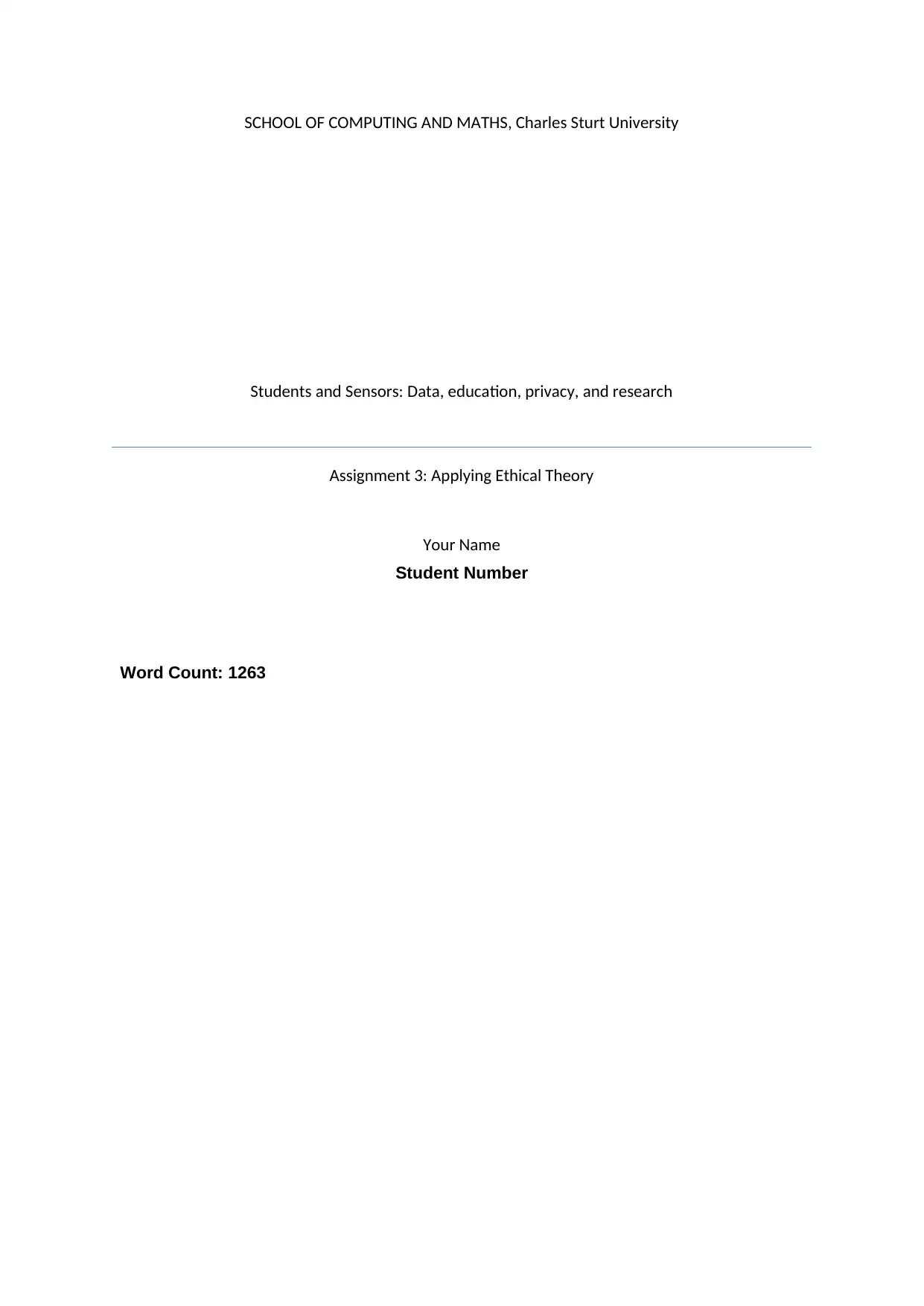
SCHOOL OF COMPUTING AND MATHS, Charles Sturt University
Students and Sensors: Data, education, privacy, and research
Assignment 3: Applying Ethical Theory
Your Name
Student Number
Word Count: 1263
Students and Sensors: Data, education, privacy, and research
Assignment 3: Applying Ethical Theory
Your Name
Student Number
Word Count: 1263
Paraphrase This Document
Need a fresh take? Get an instant paraphrase of this document with our AI Paraphraser
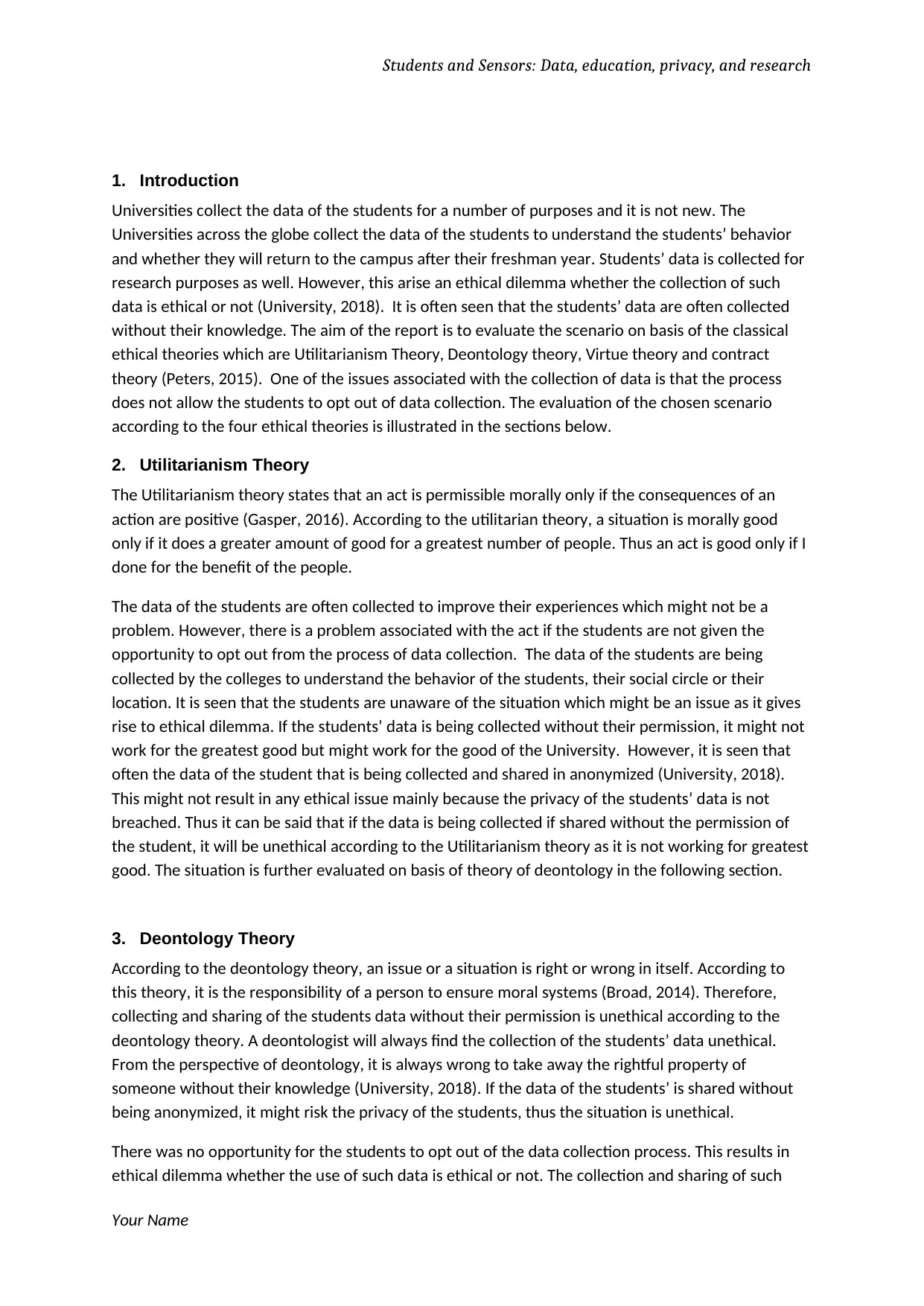
Students and Sensors: Data, education, privacy, and research
1. Introduction
Universities collect the data of the students for a number of purposes and it is not new. The
Universities across the globe collect the data of the students to understand the students’ behavior
and whether they will return to the campus after their freshman year. Students’ data is collected for
research purposes as well. However, this arise an ethical dilemma whether the collection of such
data is ethical or not (University, 2018). It is often seen that the students’ data are often collected
without their knowledge. The aim of the report is to evaluate the scenario on basis of the classical
ethical theories which are Utilitarianism Theory, Deontology theory, Virtue theory and contract
theory (Peters, 2015). One of the issues associated with the collection of data is that the process
does not allow the students to opt out of data collection. The evaluation of the chosen scenario
according to the four ethical theories is illustrated in the sections below.
2. Utilitarianism Theory
The Utilitarianism theory states that an act is permissible morally only if the consequences of an
action are positive (Gasper, 2016). According to the utilitarian theory, a situation is morally good
only if it does a greater amount of good for a greatest number of people. Thus an act is good only if I
done for the benefit of the people.
The data of the students are often collected to improve their experiences which might not be a
problem. However, there is a problem associated with the act if the students are not given the
opportunity to opt out from the process of data collection. The data of the students are being
collected by the colleges to understand the behavior of the students, their social circle or their
location. It is seen that the students are unaware of the situation which might be an issue as it gives
rise to ethical dilemma. If the students’ data is being collected without their permission, it might not
work for the greatest good but might work for the good of the University. However, it is seen that
often the data of the student that is being collected and shared in anonymized (University, 2018).
This might not result in any ethical issue mainly because the privacy of the students’ data is not
breached. Thus it can be said that if the data is being collected if shared without the permission of
the student, it will be unethical according to the Utilitarianism theory as it is not working for greatest
good. The situation is further evaluated on basis of theory of deontology in the following section.
3. Deontology Theory
According to the deontology theory, an issue or a situation is right or wrong in itself. According to
this theory, it is the responsibility of a person to ensure moral systems (Broad, 2014). Therefore,
collecting and sharing of the students data without their permission is unethical according to the
deontology theory. A deontologist will always find the collection of the students’ data unethical.
From the perspective of deontology, it is always wrong to take away the rightful property of
someone without their knowledge (University, 2018). If the data of the students’ is shared without
being anonymized, it might risk the privacy of the students, thus the situation is unethical.
There was no opportunity for the students to opt out of the data collection process. This results in
ethical dilemma whether the use of such data is ethical or not. The collection and sharing of such
Your Name
1. Introduction
Universities collect the data of the students for a number of purposes and it is not new. The
Universities across the globe collect the data of the students to understand the students’ behavior
and whether they will return to the campus after their freshman year. Students’ data is collected for
research purposes as well. However, this arise an ethical dilemma whether the collection of such
data is ethical or not (University, 2018). It is often seen that the students’ data are often collected
without their knowledge. The aim of the report is to evaluate the scenario on basis of the classical
ethical theories which are Utilitarianism Theory, Deontology theory, Virtue theory and contract
theory (Peters, 2015). One of the issues associated with the collection of data is that the process
does not allow the students to opt out of data collection. The evaluation of the chosen scenario
according to the four ethical theories is illustrated in the sections below.
2. Utilitarianism Theory
The Utilitarianism theory states that an act is permissible morally only if the consequences of an
action are positive (Gasper, 2016). According to the utilitarian theory, a situation is morally good
only if it does a greater amount of good for a greatest number of people. Thus an act is good only if I
done for the benefit of the people.
The data of the students are often collected to improve their experiences which might not be a
problem. However, there is a problem associated with the act if the students are not given the
opportunity to opt out from the process of data collection. The data of the students are being
collected by the colleges to understand the behavior of the students, their social circle or their
location. It is seen that the students are unaware of the situation which might be an issue as it gives
rise to ethical dilemma. If the students’ data is being collected without their permission, it might not
work for the greatest good but might work for the good of the University. However, it is seen that
often the data of the student that is being collected and shared in anonymized (University, 2018).
This might not result in any ethical issue mainly because the privacy of the students’ data is not
breached. Thus it can be said that if the data is being collected if shared without the permission of
the student, it will be unethical according to the Utilitarianism theory as it is not working for greatest
good. The situation is further evaluated on basis of theory of deontology in the following section.
3. Deontology Theory
According to the deontology theory, an issue or a situation is right or wrong in itself. According to
this theory, it is the responsibility of a person to ensure moral systems (Broad, 2014). Therefore,
collecting and sharing of the students data without their permission is unethical according to the
deontology theory. A deontologist will always find the collection of the students’ data unethical.
From the perspective of deontology, it is always wrong to take away the rightful property of
someone without their knowledge (University, 2018). If the data of the students’ is shared without
being anonymized, it might risk the privacy of the students, thus the situation is unethical.
There was no opportunity for the students to opt out of the data collection process. This results in
ethical dilemma whether the use of such data is ethical or not. The collection and sharing of such
Your Name
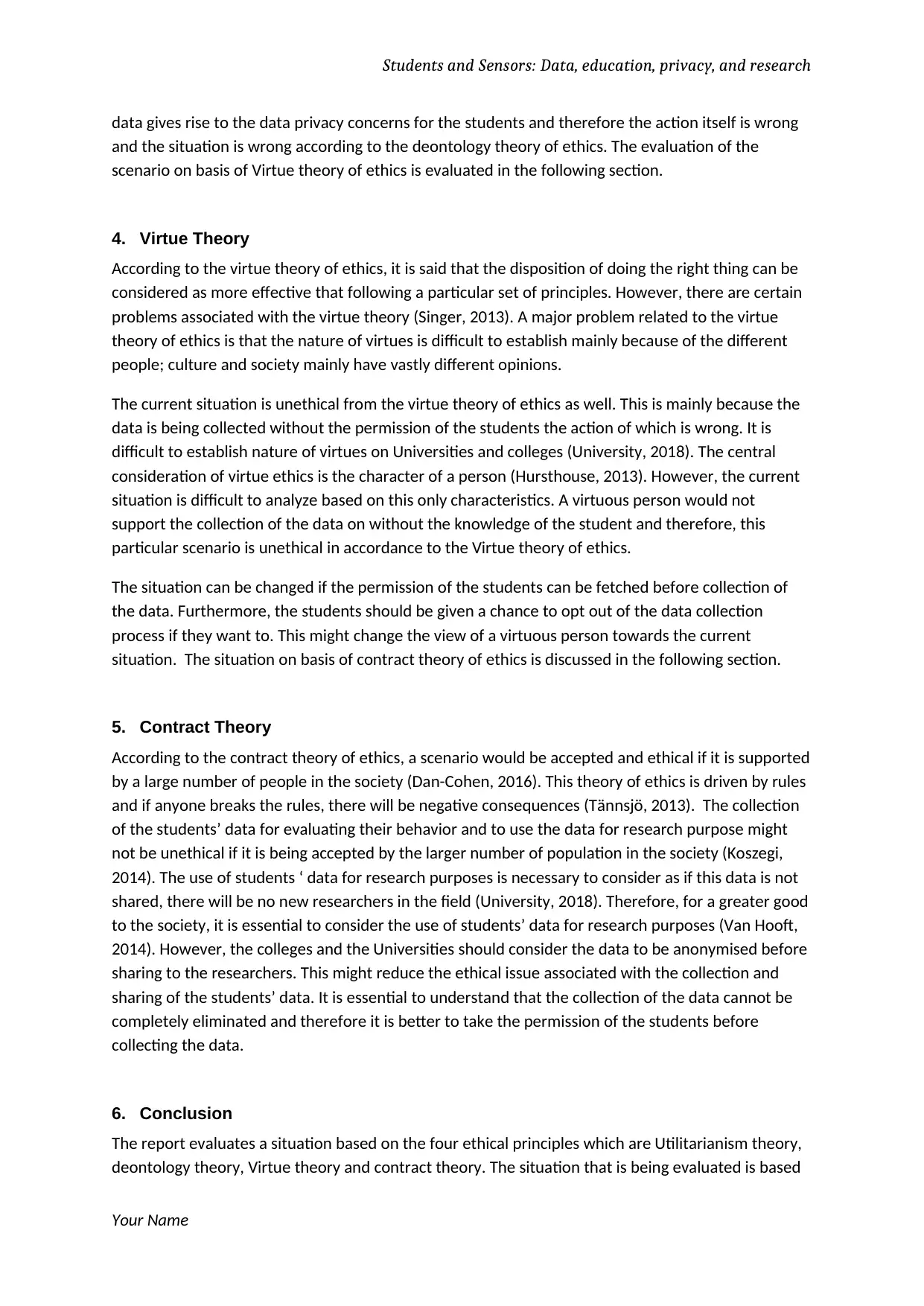
Students and Sensors: Data, education, privacy, and research
data gives rise to the data privacy concerns for the students and therefore the action itself is wrong
and the situation is wrong according to the deontology theory of ethics. The evaluation of the
scenario on basis of Virtue theory of ethics is evaluated in the following section.
4. Virtue Theory
According to the virtue theory of ethics, it is said that the disposition of doing the right thing can be
considered as more effective that following a particular set of principles. However, there are certain
problems associated with the virtue theory (Singer, 2013). A major problem related to the virtue
theory of ethics is that the nature of virtues is difficult to establish mainly because of the different
people; culture and society mainly have vastly different opinions.
The current situation is unethical from the virtue theory of ethics as well. This is mainly because the
data is being collected without the permission of the students the action of which is wrong. It is
difficult to establish nature of virtues on Universities and colleges (University, 2018). The central
consideration of virtue ethics is the character of a person (Hursthouse, 2013). However, the current
situation is difficult to analyze based on this only characteristics. A virtuous person would not
support the collection of the data on without the knowledge of the student and therefore, this
particular scenario is unethical in accordance to the Virtue theory of ethics.
The situation can be changed if the permission of the students can be fetched before collection of
the data. Furthermore, the students should be given a chance to opt out of the data collection
process if they want to. This might change the view of a virtuous person towards the current
situation. The situation on basis of contract theory of ethics is discussed in the following section.
5. Contract Theory
According to the contract theory of ethics, a scenario would be accepted and ethical if it is supported
by a large number of people in the society (Dan-Cohen, 2016). This theory of ethics is driven by rules
and if anyone breaks the rules, there will be negative consequences (Tännsjö, 2013). The collection
of the students’ data for evaluating their behavior and to use the data for research purpose might
not be unethical if it is being accepted by the larger number of population in the society (Koszegi,
2014). The use of students ‘ data for research purposes is necessary to consider as if this data is not
shared, there will be no new researchers in the field (University, 2018). Therefore, for a greater good
to the society, it is essential to consider the use of students’ data for research purposes (Van Hooft,
2014). However, the colleges and the Universities should consider the data to be anonymised before
sharing to the researchers. This might reduce the ethical issue associated with the collection and
sharing of the students’ data. It is essential to understand that the collection of the data cannot be
completely eliminated and therefore it is better to take the permission of the students before
collecting the data.
6. Conclusion
The report evaluates a situation based on the four ethical principles which are Utilitarianism theory,
deontology theory, Virtue theory and contract theory. The situation that is being evaluated is based
Your Name
data gives rise to the data privacy concerns for the students and therefore the action itself is wrong
and the situation is wrong according to the deontology theory of ethics. The evaluation of the
scenario on basis of Virtue theory of ethics is evaluated in the following section.
4. Virtue Theory
According to the virtue theory of ethics, it is said that the disposition of doing the right thing can be
considered as more effective that following a particular set of principles. However, there are certain
problems associated with the virtue theory (Singer, 2013). A major problem related to the virtue
theory of ethics is that the nature of virtues is difficult to establish mainly because of the different
people; culture and society mainly have vastly different opinions.
The current situation is unethical from the virtue theory of ethics as well. This is mainly because the
data is being collected without the permission of the students the action of which is wrong. It is
difficult to establish nature of virtues on Universities and colleges (University, 2018). The central
consideration of virtue ethics is the character of a person (Hursthouse, 2013). However, the current
situation is difficult to analyze based on this only characteristics. A virtuous person would not
support the collection of the data on without the knowledge of the student and therefore, this
particular scenario is unethical in accordance to the Virtue theory of ethics.
The situation can be changed if the permission of the students can be fetched before collection of
the data. Furthermore, the students should be given a chance to opt out of the data collection
process if they want to. This might change the view of a virtuous person towards the current
situation. The situation on basis of contract theory of ethics is discussed in the following section.
5. Contract Theory
According to the contract theory of ethics, a scenario would be accepted and ethical if it is supported
by a large number of people in the society (Dan-Cohen, 2016). This theory of ethics is driven by rules
and if anyone breaks the rules, there will be negative consequences (Tännsjö, 2013). The collection
of the students’ data for evaluating their behavior and to use the data for research purpose might
not be unethical if it is being accepted by the larger number of population in the society (Koszegi,
2014). The use of students ‘ data for research purposes is necessary to consider as if this data is not
shared, there will be no new researchers in the field (University, 2018). Therefore, for a greater good
to the society, it is essential to consider the use of students’ data for research purposes (Van Hooft,
2014). However, the colleges and the Universities should consider the data to be anonymised before
sharing to the researchers. This might reduce the ethical issue associated with the collection and
sharing of the students’ data. It is essential to understand that the collection of the data cannot be
completely eliminated and therefore it is better to take the permission of the students before
collecting the data.
6. Conclusion
The report evaluates a situation based on the four ethical principles which are Utilitarianism theory,
deontology theory, Virtue theory and contract theory. The situation that is being evaluated is based
Your Name
⊘ This is a preview!⊘
Do you want full access?
Subscribe today to unlock all pages.

Trusted by 1+ million students worldwide
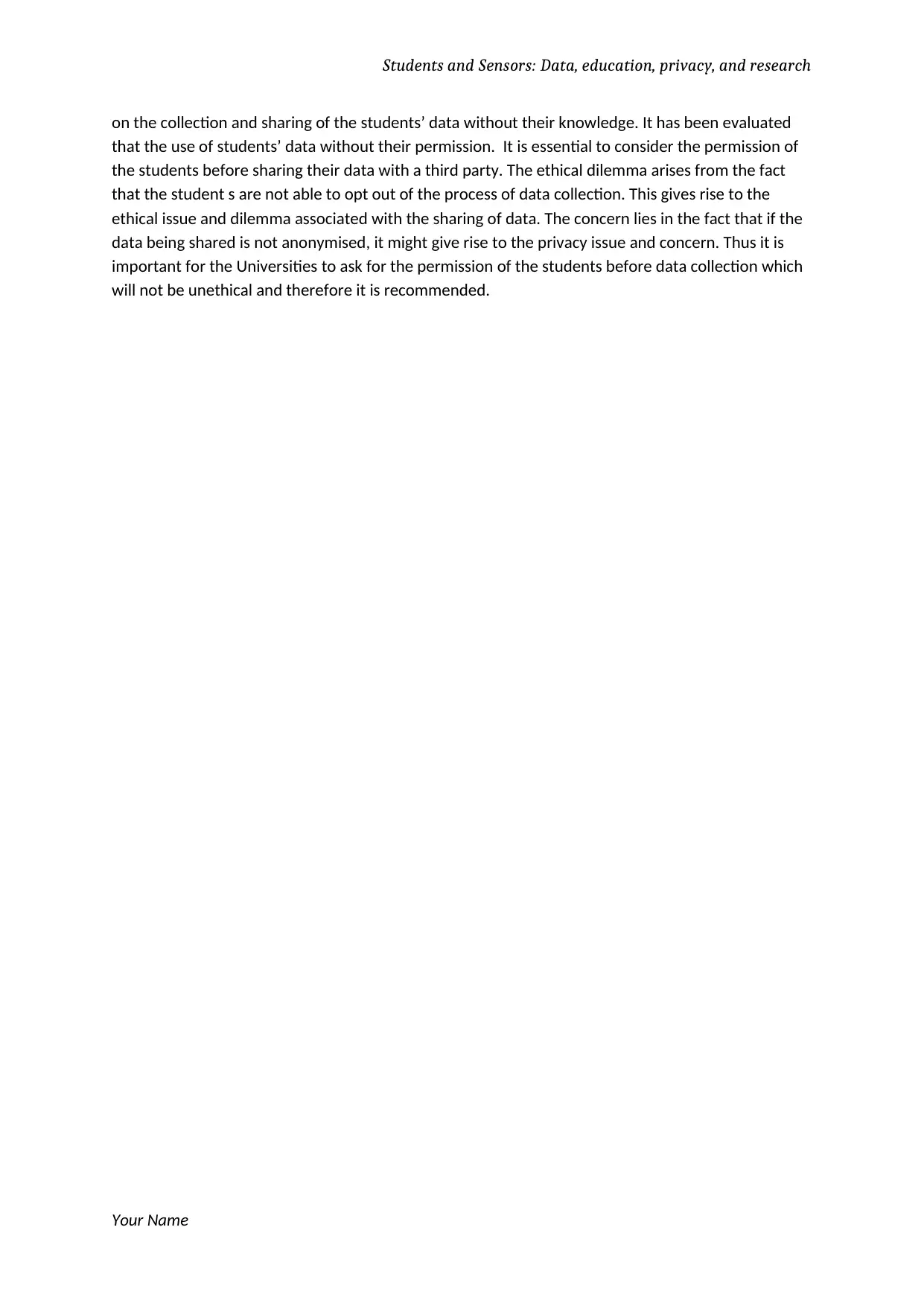
Students and Sensors: Data, education, privacy, and research
on the collection and sharing of the students’ data without their knowledge. It has been evaluated
that the use of students’ data without their permission. It is essential to consider the permission of
the students before sharing their data with a third party. The ethical dilemma arises from the fact
that the student s are not able to opt out of the process of data collection. This gives rise to the
ethical issue and dilemma associated with the sharing of data. The concern lies in the fact that if the
data being shared is not anonymised, it might give rise to the privacy issue and concern. Thus it is
important for the Universities to ask for the permission of the students before data collection which
will not be unethical and therefore it is recommended.
Your Name
on the collection and sharing of the students’ data without their knowledge. It has been evaluated
that the use of students’ data without their permission. It is essential to consider the permission of
the students before sharing their data with a third party. The ethical dilemma arises from the fact
that the student s are not able to opt out of the process of data collection. This gives rise to the
ethical issue and dilemma associated with the sharing of data. The concern lies in the fact that if the
data being shared is not anonymised, it might give rise to the privacy issue and concern. Thus it is
important for the Universities to ask for the permission of the students before data collection which
will not be unethical and therefore it is recommended.
Your Name
Paraphrase This Document
Need a fresh take? Get an instant paraphrase of this document with our AI Paraphraser
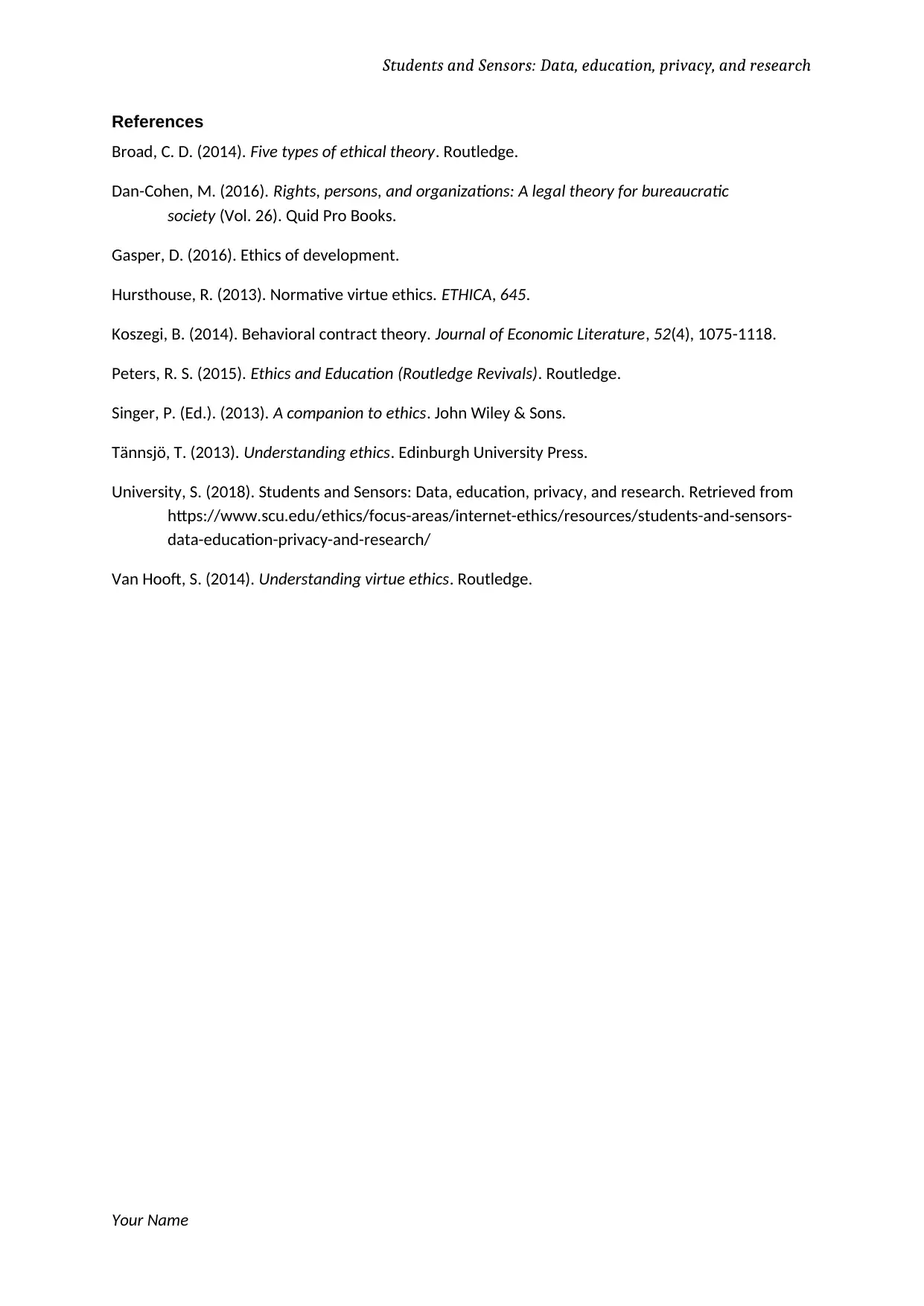
Students and Sensors: Data, education, privacy, and research
References
Broad, C. D. (2014). Five types of ethical theory. Routledge.
Dan-Cohen, M. (2016). Rights, persons, and organizations: A legal theory for bureaucratic
society (Vol. 26). Quid Pro Books.
Gasper, D. (2016). Ethics of development.
Hursthouse, R. (2013). Normative virtue ethics. ETHICA, 645.
Koszegi, B. (2014). Behavioral contract theory. Journal of Economic Literature, 52(4), 1075-1118.
Peters, R. S. (2015). Ethics and Education (Routledge Revivals). Routledge.
Singer, P. (Ed.). (2013). A companion to ethics. John Wiley & Sons.
Tännsjö, T. (2013). Understanding ethics. Edinburgh University Press.
University, S. (2018). Students and Sensors: Data, education, privacy, and research. Retrieved from
https://www.scu.edu/ethics/focus-areas/internet-ethics/resources/students-and-sensors-
data-education-privacy-and-research/
Van Hooft, S. (2014). Understanding virtue ethics. Routledge.
Your Name
References
Broad, C. D. (2014). Five types of ethical theory. Routledge.
Dan-Cohen, M. (2016). Rights, persons, and organizations: A legal theory for bureaucratic
society (Vol. 26). Quid Pro Books.
Gasper, D. (2016). Ethics of development.
Hursthouse, R. (2013). Normative virtue ethics. ETHICA, 645.
Koszegi, B. (2014). Behavioral contract theory. Journal of Economic Literature, 52(4), 1075-1118.
Peters, R. S. (2015). Ethics and Education (Routledge Revivals). Routledge.
Singer, P. (Ed.). (2013). A companion to ethics. John Wiley & Sons.
Tännsjö, T. (2013). Understanding ethics. Edinburgh University Press.
University, S. (2018). Students and Sensors: Data, education, privacy, and research. Retrieved from
https://www.scu.edu/ethics/focus-areas/internet-ethics/resources/students-and-sensors-
data-education-privacy-and-research/
Van Hooft, S. (2014). Understanding virtue ethics. Routledge.
Your Name
1 out of 5
Related Documents
Your All-in-One AI-Powered Toolkit for Academic Success.
+13062052269
info@desklib.com
Available 24*7 on WhatsApp / Email
![[object Object]](/_next/static/media/star-bottom.7253800d.svg)
Unlock your academic potential
Copyright © 2020–2026 A2Z Services. All Rights Reserved. Developed and managed by ZUCOL.
